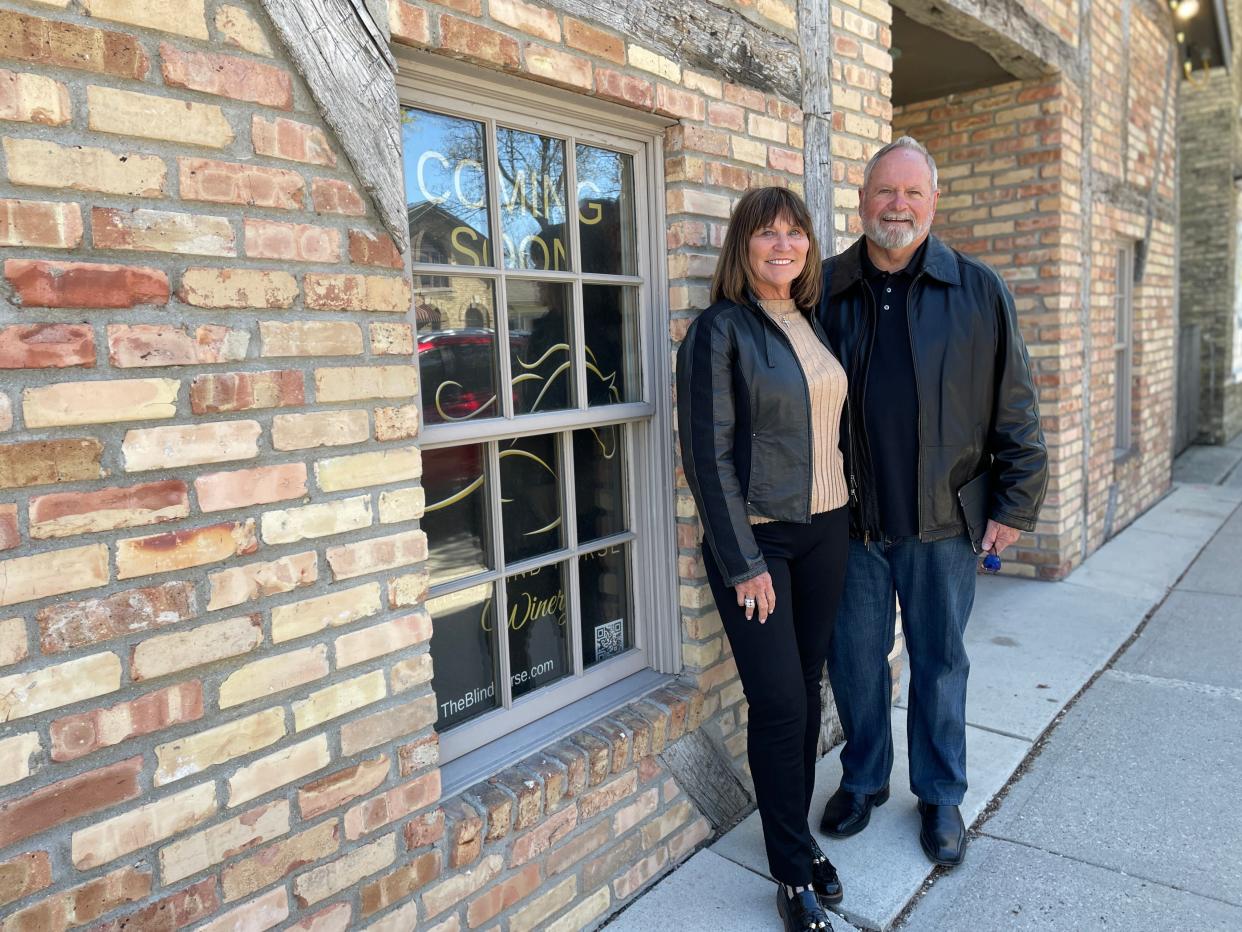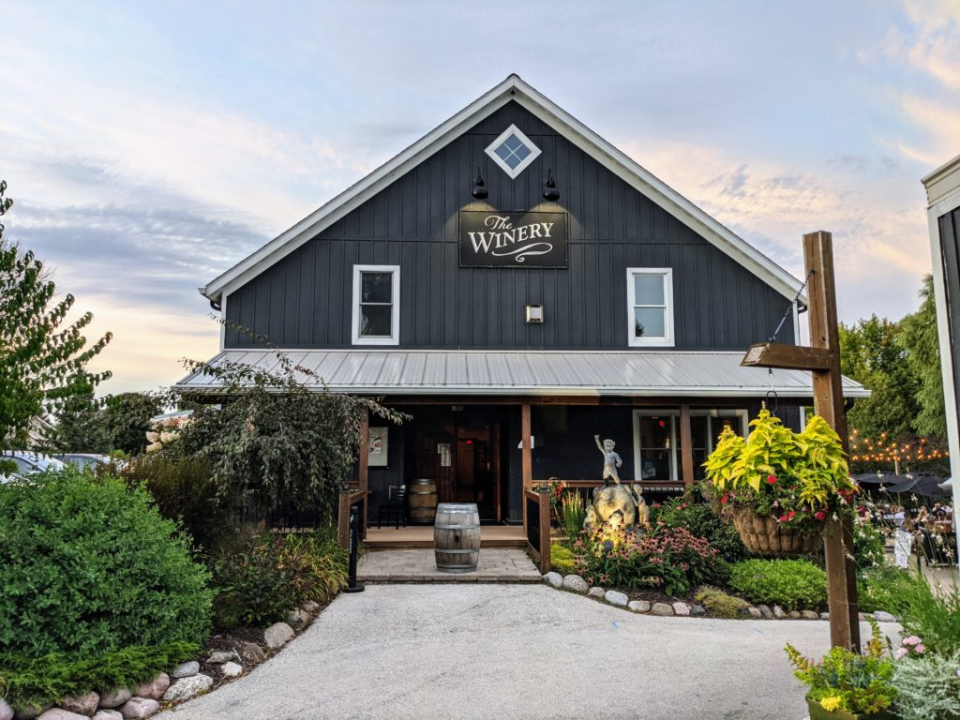Retiring hasn’t meant slowing down for Blind Horse Winery owners, now opening a Cedarburg location

After decades running a successful roofing business, Bob and Connie Moeller could have retired quietly to Florida. That’s where they were when Bob first made wine with friends.
That hobby of making wine in the garage inspired a whole new business for the couple from Elkhart Lake. It’s been 10 years since the opening of The Blind Horse Restaurant and Winery in Kohler. Much has changed in Wisconsin’s winery landscape.
Working with grapes from California, Washington and Wisconsin, Blind Horse Winery is set on seven acres and makes wines in Kohler. Their first wine was a zinfandel. They’re returning to those roots for the winery’s 10 year anniversary, releasing a special zinfandel that retails for $28 a bottle. They also created magnums for the anniversary: a 2019 Silver Saddle, a blend of cabernet sauvignon, malbec and petit verdot; and a 2019 Tuscan Blend Reserve.
While looking back, they’re also moving forward. It’s been a big year of new things for the winery.
Sheboygan native Patrick Regenwether was promoted and became winemaker in February. The Moellers are also looking forward to the next chapter for Blind Horse Winery, expanding with a second tasting room in Cedarburg.
Bob Moeller always envisioned several locations around the state, but Wisconsin laws made it tricky. As soon as they heard about Wisconsin Act 73 and the changes to Wisconsin’s alcohol beverage laws affecting wineries and tasting rooms going into effect on May 1, the Moellers jumped into action.
Year-round destinations were at the top of their list for opening a second location, and the Moellers considered Cedarburg, Lake Geneva and Green Bay. They found their perfect spot in Cedarburg, and in February purchased W63N674 Washington Ave., a building that dates to the 1840s.
Working with Sheboygan Falls’ Distinctive Design Studio and Steve Peskie, they gutted the building’s interior lower level with plans to maintain historical elements on the exterior and make modern updates inside. Stone throughout will come from Fond du Lac. The new tasting room will have a much smaller footprint than their 7-acre winery and tasting room with patio in Kohler, but plans include outdoor table seating, fire pits and a patio overlooking Cedar Creek. The new space will feature Blind Horse wines plus local beers; a limited menu is planned but will include charcuterie and their popular thin crust pizzas.
Blind Horse Winery in Cedarburg does not yet have an opening date, though plans are for it to open by the end of the year. The Kohler location will host a Blues & Wine Festival and patio opening weekend May 17-19.
The Moellers, who celebrate 53 years of marriage in June, live in Elkhart Lake. They talked with us during a visit to Cedarburg to see how renovations are progressing.

How retiring led to a Wisconsin winery
Bob: We were in Florida. Sicilian friends taught me to make wine. Their approach was very natural. We started entering competitions in Ybor City, near Tampa. ... We did that for seven years. We either took first, second, third or best overall. I called my son Matthew, who was running the roofing business. I said, “Find me a place in Sheboygan County back home where we can start a boutique winery." ... He found the piece in Kohler, a piece that was not owned by Kohler or the Kohler family, but had a Kohler address.
Behind the Blind Horse name
Bob: (The property in Kohler) is a historical piece of property. It was owned by Anton Dreps, this homestead was in the middle of the Civil War in 1860. He had Percheron draft horses. We have pictures we got from the historical society. One of his best draft horses was a blind horse named Birdy. That’s exactly how Blind Horse started.
Why Cedarburg is the first choice for a second winery
Bob: With the new legislation, I don't have to go through the tier system. ... When they said you are allowed up to three retail outlets, you will no longer get a liquor license for your wine but a winery permit, and you can have up to three outlets for one winery, we started looking around.
We've been here (in Wisconsin) since 1979. We are originally from Michigan, which has this town, Frankenmuth. One of the things we knew about Cedarburg, it is to Wisconsin what Frankenmuth is to Michigan. It is an incredible year-round destination. ... It is a destination for women. They drive the winery market. When I saw that, I thought this would be the place. I find this building. I know I have to really change it to make it what I want. I didn’t want to rent and build out. I had to talk the owner into selling. We bought the building in February.
How making wine at home influences what they do today
Bob: What I was taught from the Sicilian guys, they didn't use chemicals or sulfites for preservatives. They fermented after the primary fermentation into bourbon barrels. ... One of the other unique things they did, most wineries will take a variety of grapes, crush and ferment, then another and blend after fermented. The old-time Sicilians would take grapes by the pound or tonnage and field blend them, in other words, sangiovese, merlot, moscato, crush and de-stem all the grapes together and ferment together. ... So in Kohler we field blend our grapes.
What they love about Wisconsin grapes
Connie: We do use Wisconsin grapes. We also get grapes from Napa; Sonoma; Lodi, California; some from Washington state.
Bob: We’re not farmers, so we purchase them. The Wisconsin grapes are high in acid, low sugar. That’s the recipe for champagne, sparkling wines, because you can only call it champagne if it is that (region) in France. A few years ago we did (a sparkling wine) the old way they do it in France.
What they’ve learned about winemaking in Wisconsin
Bob: Our main goal was to have a Napa Valley-type wine tasting room in the middle of Kohler. Another insight, the palate of the people in America is way different than the people in Europe. People in Europe like aged wines. They like to drink them eight to 10 years down the line. ... People in America like to pick the bottle and drink it this weekend. They also like fruit-forward wines. ...
I talked to a bunch of different wineries (in Wisconsin). I heard, “You’ll never be able to sell dry wines. You'll have to sell sweet wines or be out of business.” That didn't happen. People liked our wines and that is our forte, the dry wines.
What they’d drink every day
Connie: I like our Chardonnay reserve aged in an oak barrel, and our cabernet.
Bob: My favorite I vary, but probably the sauvignon blanc. We make one of the best, I think.
You’d be surprised though. I drink a lot of white wine in Florida, and then I come up here and I like the cabernet. Then I go through periods I don't even like wine and I don’t drink it. I went through 15 years of no alcohol, not because of alcoholism, but I was raising boys and didn’t want it in the house.
Making the move to Cedarburg
Connie: As soon as we heard about the legislation passing, we were looking for buildings. Cedarburg was always in the forefront. It is such a gem.
Bob: I love the town, the buildings. We found a building for lease.
Connie: We were here the very next day.
Bob: I was and still am looking at Lake Geneva. We also looked at Egg Harbor in Door County, but it is less people and pretty dead in winter. We're currently looking into Green Bay, too. I like historical buildings.
How losing everything taught them the most
Connie: I would really like to put a shoutout to my late father, who started a business on a shoestring. We were very poor growing up. He had this idea, bought a swimming pool company, and we lost everything. ... "Well, we can keep water out with a roof." He was such a visionary and salesman. All of us and our family, we don’t take no for an answer. We just go forward. He said if you don't take risks, you will never get there. Failure is not an option. For that I'd like to recognize my father's training. Better than any college. I would love my mother to read that, she's 100 years old. We just sold the business.
How their wine club helped them grow
Bob: We have 900 wine club members, in a county that has 117,000 people in it. We do a wine pickup every four months. That’s an influx of cash. ... My goal is to get to producing 15,000 cases. That’s a highly profitable winery.
Connie: I think we're also here to educate people on wine, and I think we've done a pretty good job of that at Blind Horse.
Fork. Spoon. Life. explores the everyday relationship that local notables have with food. To suggest future personalities to profile, email clewis@journalsentinel.com.
Editor's note, May 6, 2024: This story has been updated with the correct name for the blind horse behind the winery's name.
This article originally appeared on Milwaukee Journal Sentinel: Blind Horse Winery owners planning a Cedarburg location

